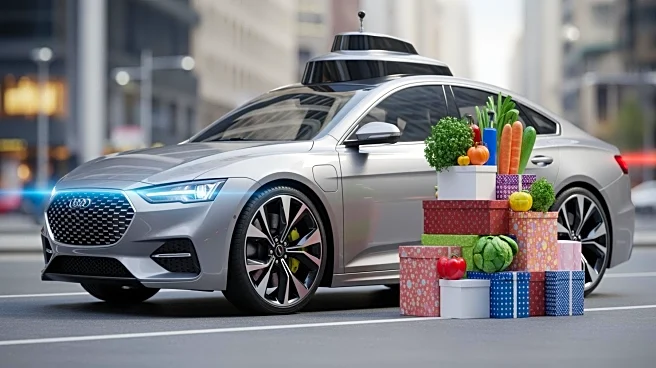What's Happening?
Uber Technologies, Inc. is experiencing significant growth, with gross bookings increasing by 21% year-over-year, marking its fastest growth since 2023. This surge is driven by heightened demand in its Mobility and Delivery sectors. The company is focusing
on long-term expansion by investing in affordability programs, grocery and retail delivery, and autonomous vehicle development. DA Davidson analyst Tom White has maintained a Buy rating on Uber, raising the price target from $102 to $108. Despite slightly below consensus adjusted EBITDA, Uber is reinvesting in major growth opportunities, including grocery and retail delivery, which have reached a $12 billion annual run rate. The company is also making strides in autonomous vehicle operations, with trip growth in markets like Austin and Atlanta exceeding the U.S. average.
Why It's Important?
Uber's strategic reinvestment in growth areas such as grocery delivery and autonomous vehicles highlights its commitment to long-term expansion over immediate profitability. This approach positions Uber to capitalize on emerging market trends and technological advancements, potentially reshaping the transportation and delivery industries. The company's focus on scaling new business lines could lead to sustained growth, benefiting stakeholders and potentially influencing industry standards. However, the emphasis on reinvestment may delay profitability, impacting short-term investor expectations. Uber's partnership with NVIDIA for autonomous vehicle development suggests a significant investment in future mobility solutions, which could redefine urban transportation.
What's Next?
Uber plans to continue prioritizing growth over short-term margins, with expectations of moderate EBITDA margin expansion in 2026. The company aims to achieve mid-to-high-teens annual gross bookings growth, 30%-40% adjusted EBITDA growth, and over 90% free cash flow conversion through 2026. As Uber advances its autonomous vehicle operations, it may need to own or operate more of its fleet initially, potentially delaying profitability. Stakeholders will be watching how Uber navigates these investments and their impact on financial performance. The company's disciplined reinvestment strategy and strong execution are expected to support sustainable long-term growth.
Beyond the Headlines
Uber's investment in autonomous vehicles and grocery delivery reflects broader industry trends towards automation and convenience. These initiatives could lead to significant shifts in consumer behavior and urban planning, as autonomous vehicles become more prevalent and grocery delivery services expand. Ethical considerations around job displacement in traditional driving roles and data privacy in autonomous vehicle operations may arise. Additionally, Uber's focus on affordability programs could influence competitive dynamics in the ride-sharing and delivery sectors, prompting other companies to adopt similar strategies.














